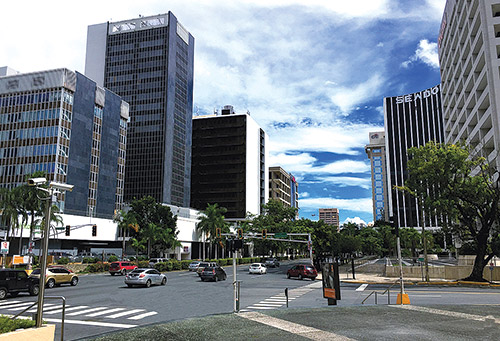Caribbean: Business Locations in Sunny Places
Sophisticated technology and infrastructure attributes, friendly wage rates, multilingual skilled labor, and sometimes surprising real estate deals make the Caribbean islands an attractive option for investment.
Q1 2021

Some of the opportunities are obvious; some may be surprising. The benefits for ocean-centric businesses, including those tied to resources and commodity exports, almost go without saying. But there are also great opportunities in services, from financial operations to call centers, as well as the digital and creative sectors and advanced manufacturing.
Similarly, there are some challenges that come immediately to mind for most observers, but advantages that may be less apparent to outsiders. Natural disasters from hurricanes to earthquakes make global headlines and thus won’t surprise anyone as they tally up the challenges. But some observers may overlook various bright points, from advanced digital infrastructure in some jurisdictions to diverse workforce capabilities in others.
A Wide Range of Industries
Consider a recent summation from the financial analysis website Investopedia. “The Caribbean region consists of small island economies that are major players in a wide range of global industries,” the analysis points out. Trinidad and Tobago, for example, has grown by way of oil and gas export revenues, and Jamaica sends the world not just tasty rum but lots of bauxite, valuable for production of aluminum and various other products. “The Dominican Republic and the Cayman Islands are well-known offshore tax havens of choice for multinational corporations and billion-dollar financial service companies,” Investopedia adds.
The World Bank describes the Caribbean as “a diverse region with significant economic potential and growth opportunities…Many small economies, including those that are tourism-dependent, were maintaining a positive growth rate prior to the onset of the COVID-19 pandemic.”
The United Nations’ Economic Commission for Latin America and the Caribbean also keeps watch over the Caribbean economy, and its most recent overview also found generally positive growth rates (again, before the pandemic rewrote the story all over the world). In particular, economies of those Caribbean nations that are part of the Eastern Caribbean Currency Union had a positive growth rate of 4.1 percent in 2019, even as there was a bit of a decline overall in the growth rates of the region’s service-producing economies. Goods-producing economies in the region were seeing slow but positive growth in 2019.
Opportunities for Renewal
Needless to say, the coronavirus pandemic threw a major wrench into the picture in 2020, but that is certainly not a challenge unique to the Caribbean. For the record, the World Bank last year was forecasting economic contraction of just under 2 percent in 2020, with tourism-dependent economies taking a hit from the slowdown in travel and the global economic struggle.
There are great opportunities in services, from financial operations to call centers, as well as the digital and creative sectors and advanced manufacturing. Aside from that wild card that affects just about everyone around the world, “Caribbean countries are extremely vulnerable to climate change and natural disasters,” according to the World Bank. “Extreme weather events are common — the region experienced three Category 5 hurricanes between 2017 and 2019.” For example, according to the U.N.’s Economic Commission for Latin America and the Caribbean, Hurricane Dorian in 2019 affected most of the population of the Bahaman islands of Abaco and Grand Bahama, with an economic price tag of $3.4 billion that’s more than a quarter of the nation’s GDP.
But fixating on such challenges would create a misleading and unfair picture of the region’s economic development prospects. Indeed — as proven by the pandemic and resulting economic downturn, along with weather catastrophes in the mainland U.S. and elsewhere — negative events can come into the picture anywhere. What’s more important is, how do the locals respond to challenges, and do the various upsides outweigh the fears of potential downsides?
Check the sidebar to this article focused on Puerto Rico for thoughts related to that first question. Disasters are a challenge, to be sure, but they also build character, strengthen ingenuity, and in some cases open the door to unexpected opportunities for renewal. As a U.S. territory, Puerto Rico gains access to relief funds that are helping the island not just recover from past natural disasters but wind up in a better place in everything from the electrical grid to educational facilities.
Other resources also provide opportunities for improvement, too. The World Bank, for example, points to an electrical distribution system modernization project that will rehab more than a thousand kilometers of distribution networks in the Dominican Republic.
Driving Positive Outcomes
And the other upsides of Caribbean business locations are more numerous than many people understand. Jamaica, for example, has a strong investment climate that drives positive outcomes in a number of focus sectors, including energy, global digital services, manufacturing, mining, agribusiness, film and, of course, tourism.
Regulatory safeguards that coexist with business friendliness is an important consideration — one for which there are positive answers in numerous Caribbean destinations. The Bahamas strives to supplement its tourist economy with investments in a variety of sectors, including banking/insurance, IT/data processing, light manufacturing, pharmaceuticals, offshore medical services, and ship repair. Or consider Barbados, which encourages investment in everything from financial services to informatics and e-commerce, which supplement tourism and light manufacturing, among other sectors.
Take manufacturing as an example. Jamaica is seen as a prime choice for near-shore facilities, aided by location, infrastructure, trade agreements that open market doors, generous business incentives, and an experienced English-speaking labor pool. Digital services is another opportunity that is an eye-opener for some. In Jamaica, for example, the sector drives more than 30,000 jobs, enabled by solid IT infrastructure, skilled labor, and laws that safeguard data.
That last point — regulatory safeguards that coexist with business friendliness — is an important consideration, one for which there are positive answers not just in Jamaica but numerous Caribbean destinations. Those with past or ongoing ties to major Western nations are among those ensuring that they deliver the right levels of regulatory security to companies that make an investment.
Puerto Rico, for example, offers intellectual property protections that stem from its U.S. ties. Turks and Caicos has British historical ties that are still reflected in its safeguards for those in financial services. The U.S. Virgin Islands as a territory has tax benefits that make doing business there in many ways like operating within America’s states. Barbados prides itself on a well-developed legal system with roots in English Common Law. Saint Lucia promotes, among other things, strong protections for intellectual property and patents.
The bottom line is, as with most places in the world, it’s well worth digging deep to get beyond the most obvious Caribbean attributes. For some, 300-plus days of sunshine and year-round warmth is plenty of reason to give Caribbean destinations high quality-of-life marks. For others, headlines of hurricanes provide enough concern to steer clear.
The real story is in the middle ground of less obvious details. That’s where the picture emerges of locations with sophisticated technology and infrastructure attributes, friendly wage rates, multilingual skilled labor, and sometimes surprising real estate deals. The culture and landscape may feel like a world apart, but the actual distance in miles can be comfortably close to markets and home offices.
Project Announcements
Berwick Industries Expands Columbia County, Pennsylvania, Operations
03/03/2026
Akston Establishes Caddo Parish, Louisiana, Manufacturing Operations
03/02/2026
US Forged Rings Plans Hertford County, North Carolina, Steel Component Operations
03/02/2026
South Korea-Based Hanjung America Plans Huntington, Indiana, Manufacturing Operations
03/02/2026
Faith Technologies Plans Opelika, Alabama, Manufacturing Operations
03/01/2026
TaylorMade Golf Expands Vanderburgh County, Indiana, Distribution Operations
03/01/2026
Most Read
-
Top States for Doing Business in 2024: A Continued Legacy of Excellence
Q3 2024
-
Speed Built In—The Real Differentiator for 2026 Site Selection Projects
Q1 2026
-
Preparing for the Next USMCA Shake-Up
Q4 2025
-
The New Industrial Revolution in Biotech
Q4 2025
-
Strategic Industries at the Crossroads: Defense, Aerospace, and Maritime Enter 2026
Q1 2026
-
The Skilled Trades Are Ready for a Digital Future
Q4 2025
-
Amazon’s First Mass Timber Delivery Station Tests the Future of Low-Carbon Logistics
Q4 2025



